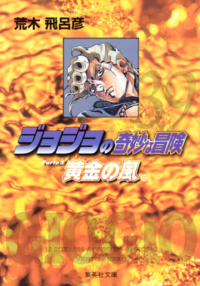Vento Aureo Bunko Vol. 10 (August 2005)
Da Vinci (August 2005)
Hirohiko Araki's afterword, written in the final volume of the Bunkoban version of Vento Aureo.
Interview
The main character in Part 3: Stardust Crusaders, Jotaro Kujo, accepts the karma he inherits from his grandfather, the karma of six generations (counting from Jonathan's father), and sets out on a journey of battle. In that situation, the main enemy, Dio Brando, also represents "fate" or "destiny" itself. Of course, no one can really tell what kind of person their ancestors from six generations earlier were. In the case of Jotaro, it's impossible for him to know what good deeds or sins his ancestors committed, but the fate of his ancestors has befallen him nonetheless. And yet, he stands up to it with the pride he inherits from his bloodline.
During the process of drawing Part 5: Vento Aureo, I thought to myself: What about those who regret being born at all? What are those people to do? People can't choose where they are born. Some are born into happy families, while others arrive in terrible circumstances. If "fate" or "destiny" is already determined, like some kind of law written by God or the movements of the stars, what are they to do? That is the theme of Part 5: Vento Aureo, as well as the protagonists and enemies who appear within it.
Giorno, Bucciarati, Fugo, Narancia, Abbacchio, and Mista. From the very beginning, they grew up being shunned by their families and by society at large. Or rather, it'd be more accurate to say that they were forced to grow up. I think the same holds true for Trish, the boss's daughter. Can they face their "destiny" and "fate" and change it somehow? That question was on my mind while drawing Part 5. Due to certain circumstances, I found myself in a bitter and dark mood at the time. What should I do? If "fate" or "destiny" could be changed just by putting in effort or courage, it'd be much too easy to do so, and we wouldn't be able to call it "destiny" at all. Then, how will the protagonists break free?
The protagonists themselves showed me the answer. They didn't try to change their "fate" or their "destiny," but refused to abandon their sense of righteousness, no matter what situation befell them. They believed that happiness dwelled within hearts of justice. It came naturally to them. Even I, as the author, was inspired by the lessons the characters taught me while I was writing the work. In that sense, when I think back on the characters in Part 5, I feel as though, instead of simply being the creations of an author, they became my own companions.
And, in light of that, let me tell you the story behind the way the work was written. In Part 5: Vento Aureo, there was one part I had to cut... or rather, an episode I could never have drawn. The setup for it was that one of the four allies (Mista, Narancia, Fugo, and Abbacchio) would be revealed as a spy for the boss who "betrays" Giorno and Bucciarati. I felt that Fugo would probably have been the "traitor," but I couldn't bring myself to draw it no matter how hard I tried.
The dark mood I was in at the time seemed to be turning my story darker and darker, and I began to despise it from the bottom of my heart. And when I thought how Bucciarati and the others would feel, I truly felt sorry for them. I had never considered that any of my own trusted friends would betray me, and the thought of it made me feel sick to my stomach. Scold me for not having enough courage as an author if you want, but I began to feel that I truly hated my profession. And to reinforce the boundary between right and wrong, I probably would've had to include an episode where Giorno would have to execute Fugo, even though I knew it would make the young boys and girls reading it feel awful.
For that reason, I instead drew the farewell scene at the landing of San Giorgio Maggiore on the Grand Canal of Venice. Essentially, I asked Fugo to disappear. (Later, for a novel adaptation of Vento Aureo, I met with the author and asked him to write a side story in which Fugo helps everyone from the shadows of the organization.)
To conclude, as the author, I would like to say one thing to my characters:Thank you all so much. In times of hardship and pain, you are the golden wind that blows in my heart.
第3部『スターダストクルセイダース』での主人公、空条承太郎は、彼のおじいさんのそのまた
承太郎かり見ればその先祖がいい事をした人なのか、間違った事をしたのかもわからないわけです。その因縁が承太郎の身の上にふりそそいで来ました。しかし彼はその血統を「誇り」に立ち向かいました。
この第5部『黄金の風』を描く時にぼくは考えました。では「生まれて来た事自体が悲しい」場合、その入物はどうすればいいのだろうか? 人は生まれる場所を選べません。幸せな家庭に生まれる人もいるし、最初からヒドイ境遇に生まれる人もいます。
で、もし「運命」とか「宿命」とかが、神様だとか、この大宇宙の星々が運行するように、法則だとかですでに決定されているものだとしたら、その人はいったいどうすればいいのだろうか? そのテーマがこの第5部『黄金の風』の設定であり、登場する主人公たちや敵たちです。
ジョルノ、ブチャラティ、フーゴ、ナランチャ、アバッキオ、ミスタ。彼らは始めっから、社会とか家庭からつまはじきにされて育ちました。育たざるを得ないという言い方が正しいと思います。ボスの娘、トリッシュもそうだと思います。
彼らは「運命」「宿命」に立ち向かい、それを変えていく事なんてできるのだろうか?
その事をずっと考えながらこの第5部を描きました。執筆した時期とか状況もあって、とても苦しく暗い気分になりました。どうしよう? 「運命」とか「宿命」とかが、そんなに簡単に人間の努力とか根性とかで変えられたら、そんなの最初から「運命」なんて言わないと思うし、軽々しすぎる。そう思いました。
じゃ主人公たちは、どうやって脱出すればいいんだ?
その答えをぼくにくれたのは誰あろう、主人公たちでした。主人公たちは「運命」や「宿命」を変えようとはせず、彼らのおかれた状況の中で「正しい心」を捨てない事を選んだのです。正義の心の中にこそ「幸福」があると彼らは信じて。自然にそうなったのです。
(作者であるぼくは)登場人物たちに逆に教わる事が執筆中出てきて、本当に勇気づけられました。そういう意味で思い返すと、第5部の登場人物は作者にとって愛着があるという感じよりはなにか、ぼくが仲間にしてもらったかのような錯覚を覚えます。
そして、その事をふまえた上での執筆の裏話をしましょう。
この第5部『黄金の風』では、どうしてもカットせざるを得ない部分があって――というよリ、どうしても描く事ができないエピソードがありました。
それは、ミスタ、ナランチャ、フーゴ、アバッキオの4人の中の誰かが、実はボスのスパイで、ジョルノとブチャラティを「裏切る」という設定でした。感覚の中ではたぶん、フーゴが「裏切り者」なんだろうなと思って描こうとしたら、これがどーしても描く事が出来ませんでした。
あの時の暗い気分がますます暗い話になっていきそうだし、実際「嫌ー」な気持ちがぼくの心の中に芽ばえてきて、しかもブチャラティとかの気持ちを考えると、本当に気の毒で、気の毒で。信頼していた仲間が裏切るなんて、ぼくの概念にはなくて、生理的に嫌な気分になりました。「作者としての勇気がたりないぞー」と叱られればそれまでなのですが、本当、絶対描くのは嫌だ、と思ってしまったのです。しかもケジメをつけるために、たぶんジョルノがフーゴの処刑に行くようなエピソードになったでしょうね。絶対に少年少女読者をヤバイ気分にさせると思い込んでしまったのです。
そういう理由で、ヴェネツィア大運河のサン・ジョルジョ・マッジョーレの船着き場での、別れのシーンです。フーゴに消えてもらったのです(のちに小説版『黄金の風』では、作家さんとの打ち合わせで、フーゴは組織の中で陰ながらみんなを助ける、という裏話を書いてもらいました)。
最後に登場人物たちに作者からひとこと言わせてください。
「本当にありがとう。君たちは、苦しくつらい時に吹いてくれる『黄金の風』なのだ」と。
[Translated by HudgynS]



